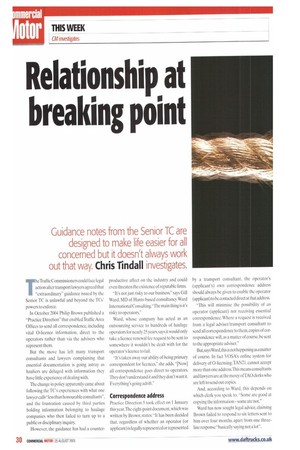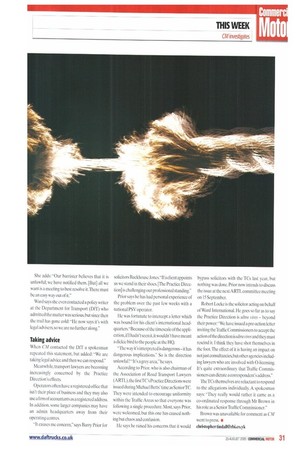Relationship at breaking point
Page 34

Page 35

If you've noticed an error in this article please click here to report it so we can fix it.
Guidance notes from the Senior IC are designed to make life easier for all concerned but it doesn't always work out that way. Chris Tindall investigates.
TheTraffic Commissioners could face legal action after transport lawyers agreed that "extraordinary" guidance issued by the Senior TC is unlawful and beyond the TCs' powers to enforce.
In October 2004 Philip Brown published a "Practice Direction" that enabled Traffic Area Offices to send all correspondence, including vital 0-licence information, direct to the operators rather than via the advisers who represent them.
But the move has left many transport consultants and lawyers complaining that essential documentation is going astray as hauliers are deluged with information they have little experience of dealing with.
The change in policy apparently came about following the TC's experiences with what one lawyer calls "less than honourable consultants", and the frustration caused by third parties holding information belonging to haulage companies who then failed to turn up to a public or disciplinary inquiry.
However, the guidance has had a counter productive affect on the industry and could even threaten the existence of reputable firms.
"It's not just risky to our business,says Gill Ward. MD of Hants-based consultancy Ward International Consulting."The main thing is it's risky to operators."
Ward, whose company has acted as an outsourcing service to hundreds of haulage operators for nearly 25 years,says it would only take a licence renewal fee request to be sent to somewhere it wouldn't be dealt with for the operator's licence to fail.
"It's taken away our ability of being primary correspondent for licences." she adds. -[Now] all correspondence goes direct to operators. They don't understand it and they don't want it. Everything's going adrift."
Correspondence address Practice Direction 5 took effect on 1 January this year.The eight-point document, which was written by Brown, states:" It has been decided that, regardless of whether an operator (or applicant) is legally represented or represented by a transport consultant, the operator's (applicant's) own correspondence address should always be given to enable the operator (applicant) to be contacted direct at that address.
-This will minimise the possibility of an operator (applicant) not receiving essential correspondence. Where a request is received from a legal adviser/transport consultant to send all correspondence to them, copies of correspondence will, as a matter of course, he sent to the appropriate adviser."
But,saysWard, this is not happening as a matter of course. In fact VOSA's online system for delivery of 0-licensing,TAN21, cannot accept more than one address.This means consultants and lawyers are at the mercy ofTA0 clerks who are left to send out copies.
And, according to Ward. this depends on which clerk you speak to. "Some are good at copying the information-some are not."
Ward has now sought legal advice, claiming Brown failed to respond to six letters sent to him over four months, apart from one threeline response "basically saying not a lot". She adds: "Our barrister believes that it is unlawful; we have notified them. [But] all we want is a meeting to best resolve it.There must be an easy way out of it."
Ward says she even contacted a policy writer at the Department for Transport (DfT) who admitted the matter was serious, but since then the trail has gone cold: "Ile now says it's with legal advisers, so we are no further along."
Taking advice
When CM contacted the DIT a spokesman repeated this statement, but added: "We are taking legal advice and then we can respond."
Meanwhile, transport lawyers are becoming increasingly concerned by the Practice Direction's effects.
Operators often have a registered office that isn't their place of business and they may also use a lirm of accountants as a registered address. In addition, some larger companies may have an admin headquarters away from their operating centres.
"It causes me concern," says Barry Prior for solicitors Backhouse Iones."If a client appoints us we stand in their shoes. [The Practice Direction] is challenging our professional standing."
Prior says he has had personal experience of the problem over the past few weeks with a national PSV operator.
He was fortunate to intercept a letter which was bound for his client's international headquarters."Because of the timescale of the applicationif I hadn't seen it, it wouldn't have meant a dickie bird to the people at the HQ.
"The way it's interpreted is dangerous — it has dangerous implications." So is the direction unlawful? "It's a grey area," he says.
According to Prior, who is also chairman of the Association of Road Transport Lawyers (A RTL). the firstTC's Practice Directions were issued during Michael Betts' time as Senior TC. They were intended to encourage uniformity within the Traffic Areas so that everyone was following a single procedure. Most, says Prior, were welcomed, but this one has caused nothing but chaos and confusion.
I le says he raised his concerns that it would bypass solicitors with the TCs last year, but nothing was done. Prior now intends to discuss the issue at the next ARTL committee meeting on 15 September.
Robert Locke is the solicitor acting on behalf of Ward International. He goes so far as to say the Practice Direction is ultra vires — beyond their power: "We have issued a pre-action letter inviting the Traffic Commissioners to accept the action of the direction is ultra vires and they must rescind it. I think they have shot themselves in the foot. The effect of it is having an impact on not just consultancies, but other agencies including lawyers who are involved with 0-licensing. It's quite extraordinary that Traffic Commissioners can dictate a correspondent's address" The TCs themselves are reluctant to respond to the allegations individually. A spokesman says: "They really would rather it came as a co-ordinated response through Mr Brown in his role as a Senior Traffic Commissioner."
Brown was unavailable for comment as CM went to press. •
christopher tindall@rbi.co.yk






























































































































































































